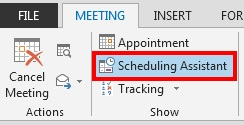If you've created a meeting in Outlook, and one of the meeting attendees no longer needs to attend, you can remove them from the meeting request.
-
From the calendar in classic Outlook, open the meeting invitation you want to edit. If it’s a recurring meeting, you can choose whether you want to edit the entire series or only one occurrence of the meeting.
-
You can delete a person from the To line of the meeting request, or use the Scheduling Assistant from the Meeting menu.
-
If you're using the Scheduling Assistant, in the All Attendees list, clear the check box next to the name of the person you want to remove.
-
Click Send to confirm the update.
When you send the update, classic Outlook asks you to choose whether to send the update to everybody or only to those affected by the change. If you send the update only to added or deleted attendees, other people aren’t notified about the updated information.
Remove an attendee from an ongoing online meeting in Skype or Teams
You can also remove an attendee from an online meeting scheduled in Outlook and running in Skype or Teams when the meeting is in progress.
-
In the meeting window, click the Participants icon to see all of the attendees.
-
Right-click the name of the person you want to remove.
-
In the drop-down menu, choose Remove. The attendee is removed from the meeting. They can rejoin if they still have the meeting invitation.
See Also
-
On the calendar in new Outlook, double-click the item you want to edit.
-
In the list of attendees, find the name you want to remove, then select the to the right of the name.
-
When you're done changing the attendee list, select Send.












